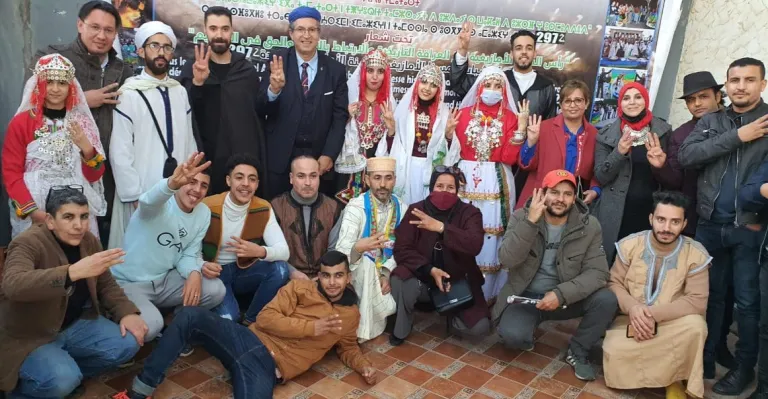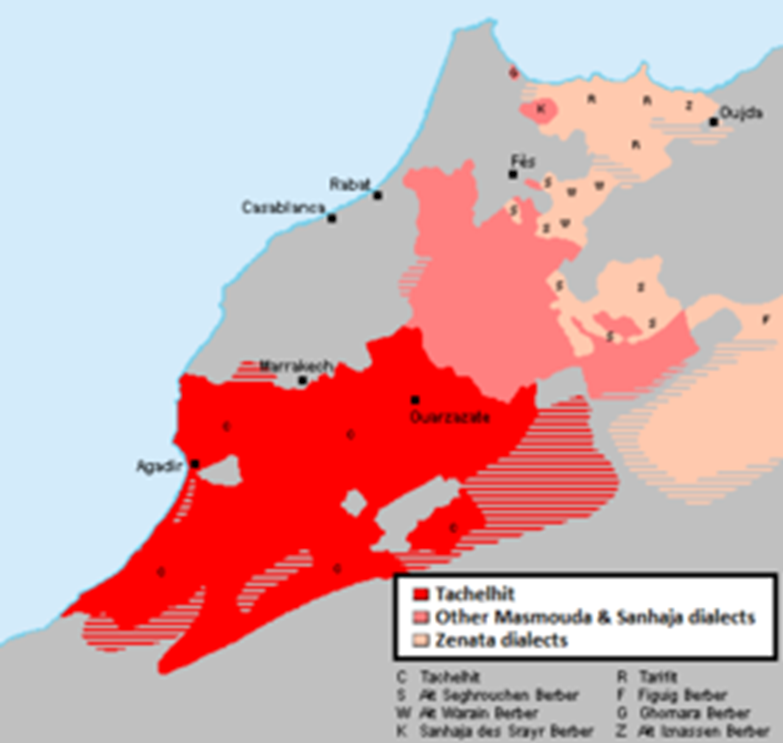“Ashalhin” and Al-Qadhiyah

Recently, among those interested in the Amazigh identity and its generalization and restoration of its status as the basic, living and immortal essence of “Tamazgha”, we find that there is discrimination such that a part of the Amazigh people is excluded indirectly, by stripping it of its name. Unlike the rest of the groups that maintained their name without any objection, such as “Riyafa,” “Azian,” “Aqbailin,” and many others, and this is on the pretext that “Shaluh” is a profane Arabic word derived from the verb “Shalah,” which means nakedness, so it is said that He stripped him of his clothes, meaning he stripped them off and removed them from him. It is also possible to say “shallah” meaning robbing, so it is said that “shallah” means bandits, meaning they stole what he had and took away his property. Thus, the word “shaloh” means bandits, and it is said that the Arabs were the ones who gave this name. Among the Amazighs of Souss, Al Haouz is in the direction of “Ahahan” and the south-east during the era of the Almohad state because they were blocking the road for their caravans. To support this proposition, it is said that the letter “ha” is foreign to the Amazigh language, but does this mean that all words that include the letter “ha” “Ha” is of Arabic origin?
Then, if the Arabs were the ones who gave the name “Shalouh” to that group of Amazighs, what was their previous original name?
How is it possible for an entire people, with its scholars and jurists, to adopt a defamatory name by which they identify themselves before those of their identity?
Is it a good idea to search for the words “Shallouh” and “Ashhalhin” in the Arabic dictionary at all?

This is similar to searching for the word “Taarabt”, which is a distortion of the Arabic word, which is supposed to mean Arabic, but we find other meanings for it, such as porpoise and dolphin, but does this mean that Arabic is a derogatory name that must be changed? Of course, and certainly not. Because a non-Arabic dictionary was used to explain it, and it is natural to find similar words in other dictionaries, but with different meanings, even if there is similarity at the level of letters and vowels.
The same applies to the word “Ashlahi”, which is very far from the word “Shalhit”, whether in meaning, vowels, or even letters. There is no complete similarity in anything. “Ashlahi” is masculine to the word “Tashalhit”, which is used to refer to the feminine and in the language in which it is spoken among the population.” “Ashhalhin”, which is an ancient name that is not recent, as it was mentioned by “Ibn al-Raqiq of Cyrene”. (He lived during the tenth century AD, that is, before the establishment of the Almohad state, which did not rule North Africa until the twelfth century AD), where he says: “The ancient Africans who are called Shaluha or barbarians, even though they are dispersed throughout all of Africa... and the people of Ghamara speak... The Hawara people who live in the Anti-Atlas Mountains (meaning the Rif Mountains) have a corrupted Arabic language, and so do all the inhabitants of the Berber countries residing between the High Atlas and the sea, but the inhabitants of Marrakesh and all the provinces of this kingdom, whether they include the Numidians or the Getuls residing to the west, speak the language. The pure African name is called Shalha and Tamazight, and they are two very old names.”, as mentioned by “Luis del Marmoa Cardebhal” in his book “Description of Africa,” and none of the historians mentioned it on the basis that it is an offensive word.

Despite this, there are those who believe that the name “Shalouh” is a more well-known word in the oral dictionary than in the written one, as we do not find it in writings very often, but rather its counterpart “Samouda” or “Al-Musamidah” is used, especially in Arabic-Islamic writings, which is derived from the verb steadfast. He endures, and steadfastness means steadfastness and stability, the same meaning that the verb “Ishlah” carries in the “Tashalhit” dialect: “settled and established” in the place.
But we find that there are those who began to dismantle the name “Masmouda,” and in the midst of this dismantling, disagreement was found, and the sects divided into two groups:
The first group: Masmouda is composed of “mess, mas”, which symbolizes ownership and the owner of the thing, and “amud”, which means seeds. The second group: Masmouda is derived from “Amz Amud” (because the letter “zai” in Arabization is transformed into “sada”, “Azom”: fasting, “Tazalit”: prayer), and the word “Amz” is composed of “um” as two letters that begin the active participle in “Tashalhit” and “az”. Or “Azo” which means he planted, and he did the act of planting.
Based on the division, it is clear that both groups (the first team: Mas Amoud, the second team: Amz Amoud) agree that the origin of the name Masmouda means the farmer or the person who does the act of agriculture (and only the sedentary person cultivates).

After all these different and different interpretations, “Ishlahi” is still shrouded in ambiguity, but everything that has been said denies that it is a defamatory name that offends its people and must be abandoned and replaced with “Amazigh”, knowing that “Ashlahi” He is among the Amazigh people who combine “Erfin”, “Aqbailin”, “Izian”, Canary Amazigh and many others, and “Tashalhit” is a dialect in the Amazigh language like other dialects.
The “Ishalhin” are not strangers to this culture. They constitute a significant portion of the Amazigh people and are also among the peoples who are most conservative regarding social values and customs. Therefore, it is never right or rational to refuse to name them over other names simply because of a mistaken belief, despite which they are proud. Because they are Amazigh in general and “Ashhlhin” in particular.
*Mina Hek
A first-year university student
Un étudiant de première année universitaire

